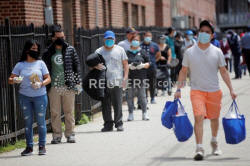Exclusive: U.S. government's boxed food aid promise
falls short
 Send a link to a friend
Send a link to a friend
 [July 07, 2020] By
Christopher Walljasper [July 07, 2020] By
Christopher Walljasper
CHICAGO (Reuters) - The U.S. government
delivered far less food aid than it had pledged by the end of June,
according to food bank managers and data from the agriculture department
sent to Reuters, after it hired inexperienced companies to box food
during the pandemic.
The Farmers to Families Food Box program, one of several new government
efforts to relieve struggling Americans, aimed to take food from farmers
typically produced for restaurants and deliver it to the millions of
people who lost their jobs or were otherwise hit by the coronavirus
lockdown.
But the program has drawn criticism from food banks, analysts and some
U.S. senators for awarding contracts to often inexperienced vendors that
were unable to source the food and deliver it in a timely manner.
Data sent to Reuters shows the program fell short of its target to
deliver $1.2 billion worth of food to food banks, churches, and other
organizations in need by June 30, a goal announced when food box
contracts were awarded to private venders on May 8.

The agency expects to verify a total of 27.5 million food boxes
delivered from the first round of the program, a USDA representative
said in an email. That is equivalent to $755.5 million, according to
calculations by Reuters based on the average cost of food boxes provided
by USDA, or 63% of the $1.2 billion pledged.
Overburdened food banks across the country were optimistic that the
program would bring ready-to-deliver food to families in need.
The program, championed by the daughter of U.S. President Donald Trump,
Ivanka Trump, sought to build a bridge between people unable to buy
enough food and farmers who were dumping milk, euthanizing hogs and
destroying lettuce fields as demand from shuttered restaurants fell off.
But deliveries were slow to start and have amounted to less than
promised as some of the companies involved had never worked with food
banks or even wholesale food distribution. [L1N2CW2Y0]
"We're getting about 60% of what we were told we would get," said Brian
Greene, CEO of the Houston Food Bank, in an email. "Some of it was
vendors couldn't do what they said they would do."
The USDA representative, who asked not to be named, said the agency is
continuing to review food deliveries to ensure quality and safety
standards. USDA canceled two contracts within the first few weeks of the
program, and did not renew 16 others. The agency representative did not
comment on the June 30 delivery shortfall.

[to top of second column] |

People wait in line at a food bank at St. Bartholomew Church, during
the outbreak of the coronavirus disease (COVID-19) in the Elmhurst
section of Queens, New York City, New York, U.S., May 15, 2020.
REUTERS/Brendan McDermid/File Photo

The Trump administration announced up to $3 billion for the Food Box program in
April as part of a broader aid initiative for farmers.
Last week, the USDA said it was renewing $1.2 billion in food box contracts from
more than 185 food distributors to be delivered by the end of August. The agency
is also offering new contracts to 16 new food distributors totaling $180
million.
'SUPPOSED TO EASE THE BURDEN'
With vendors falling short on deliveries, food banks have reassigned employees
to manage the program and volunteered their own trucks to get the food into the
hands of those who need it.
"We're dedicating significant staff time to coordinate these deliveries - in
some case we have to do the deliveries ourselves," said Greg Trotter, senior
manager of public relations for the Greater Chicago Food Depository. "It was
supposed to ease some burden from food banks. That has not been the case here
for us."
When the deliveries come through, Trotter said the program has provided
high-quality food to a rising number of out-of-work Americans. The Greater
Chicago Food Depository has seen a 90% increase in people served since January.

By early June, the number of Americans facing food insecurity doubled compared
with pre-coronavirus, according to data from U.S. Census Bureau's weekly
Household Pulse Survey.
Among the vendors not renewed in the second round was event planner Texas-based
CRE8AD8 LLC. The company, pronounced "Create a Date," had to hire people for
every role needed to fulfill its $39.13 million contract.
According to the Houston Food Bank's Greene, CRE8AD8 delivered just 17 of its 90
promised food box loads.
(Reporting by Christopher Walljasper in Chicago; Editing by Caroline Stauffer
and Matthew Lewis)
[© 2020 Thomson Reuters. All rights
reserved.] Copyright 2020 Reuters. All rights reserved. This material may not be published,
broadcast, rewritten or redistributed.
Thompson Reuters is solely responsible for this content. |